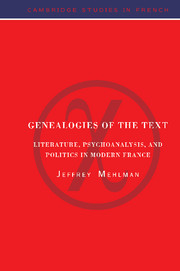Book contents
- Frontmatter
- Contents
- Acknowledgments
- 1 Introduction
- 2 Craniometry and criticism: notes on a Valéryan criss-cross
- 3 Literature and hospitality: Klossowski's Hamann
- 4 Literature and collaboration: Benoist-Méchin's return to Proust
- 5 “Pierre Menard, author of Don Quixote” again
- 6 Iphigenia 38: deconstruction, history, and the case of L'Arrêt de mort
- 7 Writing and deference: the politics of literary adulation
- 8 Perspectives: on Paul de Man and Le Soir
- 9 Prosopopeia revisited
- 10 The paranoid style in French prose: Lacan with Léon Bloy
- 11 The Holocaust comedies of “Emile Ajar”
- 12 Pour Sainte-Beuve: Maurice Blanchot, 10 March 1942
- 13 Flowers of evil: Paul Morand, the Collaboration, and literary history
- Appendix
- Notes
- Index
- Series list
3 - Literature and hospitality: Klossowski's Hamann
Published online by Cambridge University Press: 19 January 2010
- Frontmatter
- Contents
- Acknowledgments
- 1 Introduction
- 2 Craniometry and criticism: notes on a Valéryan criss-cross
- 3 Literature and hospitality: Klossowski's Hamann
- 4 Literature and collaboration: Benoist-Méchin's return to Proust
- 5 “Pierre Menard, author of Don Quixote” again
- 6 Iphigenia 38: deconstruction, history, and the case of L'Arrêt de mort
- 7 Writing and deference: the politics of literary adulation
- 8 Perspectives: on Paul de Man and Le Soir
- 9 Prosopopeia revisited
- 10 The paranoid style in French prose: Lacan with Léon Bloy
- 11 The Holocaust comedies of “Emile Ajar”
- 12 Pour Sainte-Beuve: Maurice Blanchot, 10 March 1942
- 13 Flowers of evil: Paul Morand, the Collaboration, and literary history
- Appendix
- Notes
- Index
- Series list
Summary
On several occasions, Walter Benjamin, in his letters of 1936, acknowledges his delight at the talent of Pierre Klossowski, then embarked on a translation of his essay, “The Work of Art in the Age of Mechanical Reproduction.” It was a task that was to leave its mark on the Frenchman's later work. For Benjamin's celebrated meditation on the “revolutionary” esthetic import of photography, an art whose very mode of production is inseparable from a technique of reproduction, furnishes several motifs of the almost Baudelairean prose poem on photography in La Révocation de l'Edit de Nantes. Octave, in his journal (in that novel), praises the blessed days when Daguerre “fixait la vie quotidienne d'alors sur le point d'être atteinte par l'austérité enlaidissante des premières industries …” (p. 47). The nostalgic phase, however, is eclipsed by a rhetorical explosion attempting to convey the energy unleashed by the new technique (“centuplant les intentions agressives de la pensée … désarticulant les structures”) and whose upshot is that painting itself (in the figure of van Gogh) is no longer the same. That retroactive effect of photography on all of art, the “primary question” of Benjamin's essay, furnishes the conclusion of Klossowski's prose poem: “La photographie a libéré la peinture du besoin d'imiter la nature …” (p. 47). The essential relation to presence, in Klossowski as in Benjamin, is the principal casualty of photographic technique.
Painting/photography: the split around which Benjamin's article is organized reproduces a crucial division between the first and second volumes of Klossowski's novelistic trilogy, Les Lois de l'hospitalité.
- Type
- Chapter
- Information
- Genealogies of the TextLiterature, Psychoanalysis, and Politics in Modern France, pp. 33 - 52Publisher: Cambridge University PressPrint publication year: 1995



